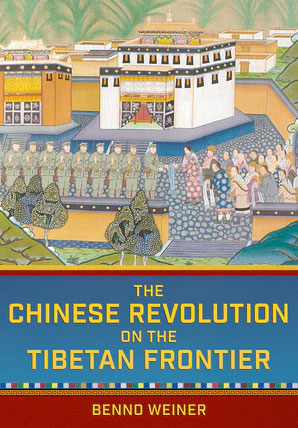
Benno Weiner
Associate Professor and Director of Graduate Studies, History
- Baker Hall 242-A
- 412-268-1610
Bio
Benno Weiner is a historian of Modern China, Tibet and Inner Asia. His work focuses on the ethnopolitics of twentieth-century state and nation building along China’s ethnocultural frontiers. It is driven by an otherwise unremarkable observation: that the prolonged, violent, and incomplete processes by which dominions of the Qing Empire were remade into integral parts of the consolidated Chinese state, and by which the disparate peoples who inhabit those areas were minoritized, marginalized, excluded, and even eliminated, are among the key underexplored and unresolved questions of modern Chinese history. Dr. Weiner is currently working on a book manuscript with the working title, “Imperial Borderland to Socialist State: Disintegration, Territorialization, and Minoritization on the Ethnic Margins of Modern China,” as well as a public-facing book presently titled, “Making Minorities in Modern China.”
 Dr. Weiner’s first book, The Chinese Revolution on the Tibetan Frontier (Cornell UP, 2020) is the first major study to employ significant county-level archival material to explore the Chinese Communist Party’s practices of state- and nation-building in an “ethnic minority region” during the first decade of the People’s Republic of China. Focusing on the Amdo region of the Tibetan Plateau, he argues that in the years immediately following the 1949 revolution, Party leaders implicitly understood both the administrative and epistemic obstacles to transforming what had been an expansive, variegated, and vertically organized imperial formation into an integrated, socialist, multinational-state. For much of the 1950s, the CCP therefore adapted imperial strategies of rule meant to “gradually,” “voluntarily,” and “organically” bridge the gap between empire and nation. This gradualist approach, however, ultimately lost out to both Han-centric impulses and revolutionary impatience that demanded more immediate paths to national integration and socialist transformation. This led in 1958 to a large-scale rebellion and its brutal pacification. Rather than an “organic transformation,” Weiner shows that the Amdo region was incorporated through the widespread and often indiscriminate deployment of state violence, and he details the long-term consequence both for Amdo Tibetans and for the state’s nation-building aspirations. Read more here Watch here Listen here
Dr. Weiner’s first book, The Chinese Revolution on the Tibetan Frontier (Cornell UP, 2020) is the first major study to employ significant county-level archival material to explore the Chinese Communist Party’s practices of state- and nation-building in an “ethnic minority region” during the first decade of the People’s Republic of China. Focusing on the Amdo region of the Tibetan Plateau, he argues that in the years immediately following the 1949 revolution, Party leaders implicitly understood both the administrative and epistemic obstacles to transforming what had been an expansive, variegated, and vertically organized imperial formation into an integrated, socialist, multinational-state. For much of the 1950s, the CCP therefore adapted imperial strategies of rule meant to “gradually,” “voluntarily,” and “organically” bridge the gap between empire and nation. This gradualist approach, however, ultimately lost out to both Han-centric impulses and revolutionary impatience that demanded more immediate paths to national integration and socialist transformation. This led in 1958 to a large-scale rebellion and its brutal pacification. Rather than an “organic transformation,” Weiner shows that the Amdo region was incorporated through the widespread and often indiscriminate deployment of state violence, and he details the long-term consequence both for Amdo Tibetans and for the state’s nation-building aspirations. Read more here Watch here Listen here

Other Select Publications:
- “This is Absolutely Not a Hui Rebellion! The Ethnopolitics of Great Nationality Chauvinism in Early-Maoist China,” Twentieth-Century China, 48.3 (2023) (read accompanying interview)
- “Mediating Disputes, Making Minzu: Minoritization on an Ethnocultural Frontier of Early Maoist China,” in How Maoism was Made, edited by Aaron Moore and Jennifer Altehenger (Oxford: Oxford University Press, forthcoming)
- “Fear and Writing in Xinjiang: On Tahir Hamut Izgil’s ‘Waiting to be Arrested at Night’ and Perhat Tursun’s ‘The Backstreets,’” Los Angeles Review of Books, November 28.
- "In the Footsteps of Garaman or Han Yinu? Rebellion, Nationality Autonomy and Popular Memory among the Salar of Xunhua County," in Muslims in Amdo Tibetan Society: Multi-Disciplinary Approaches, edited by Horlemann, Nietupski, and Hille (Lexington, 2015)
- "Tibet in China? China in Tibet: An Historical Overview" in the Handbook on Minorities in China, edited by Zang Xiaowei (Elgar, 2016).
Education
Ph.D.: Columbia University, 2012Courses Taught
- 79-210 Ethnicity, Identity, and Place in Modern China
- 79-261 The Last Emperors: Chinese History and Society, 1600-1900
- 79-262 Modern China: From the Birth of Mao ... to Now
- 79-263 Mao and the Chinese Cultural Revolution
- 79-264 Tibet and China: History and Propaganda
- 79-309 The Chinese Revolution Through Film (1949-2000)
- 79-216 Genghis Khan and the Mongol Empire
- 79-219 Hong Kong, Taiwan and the Question of "China"
- 79-218 Tiananmen Square and Popular Protest in Modern China
Department Member Since: 2015